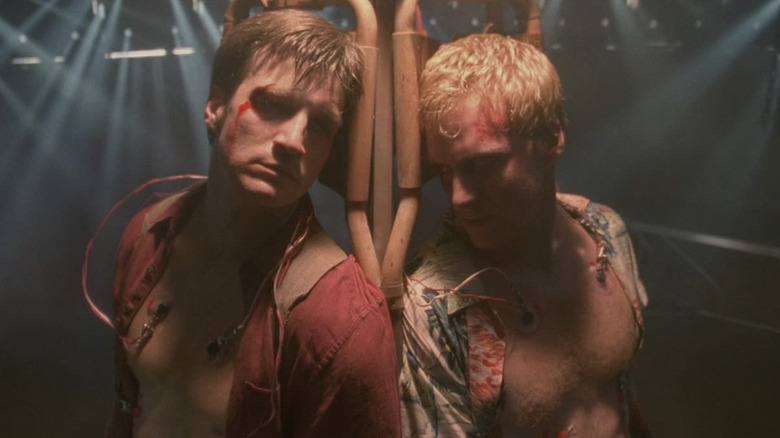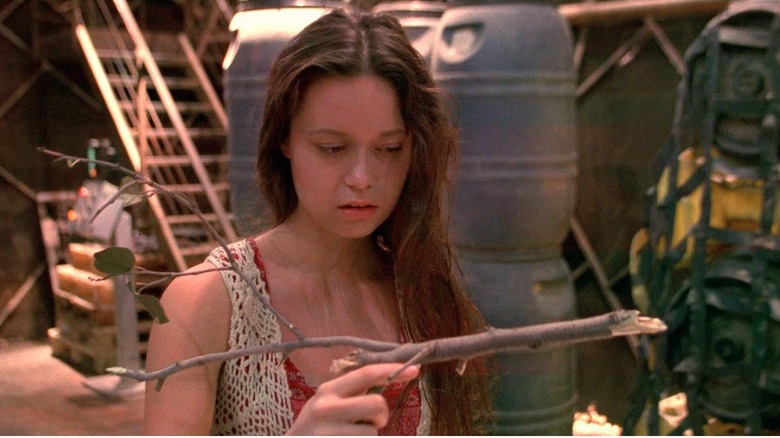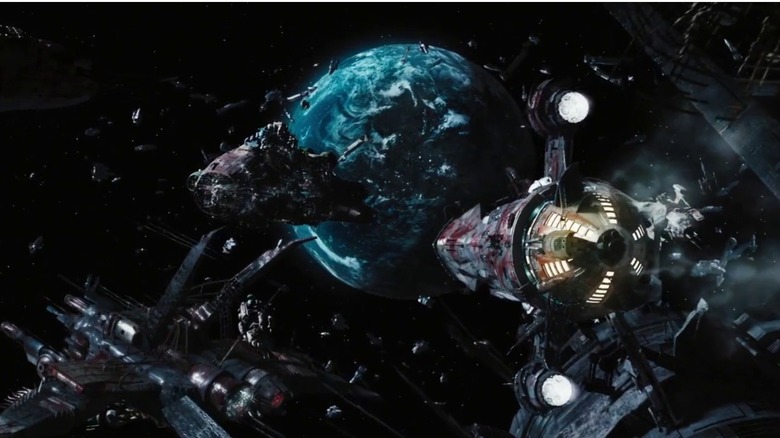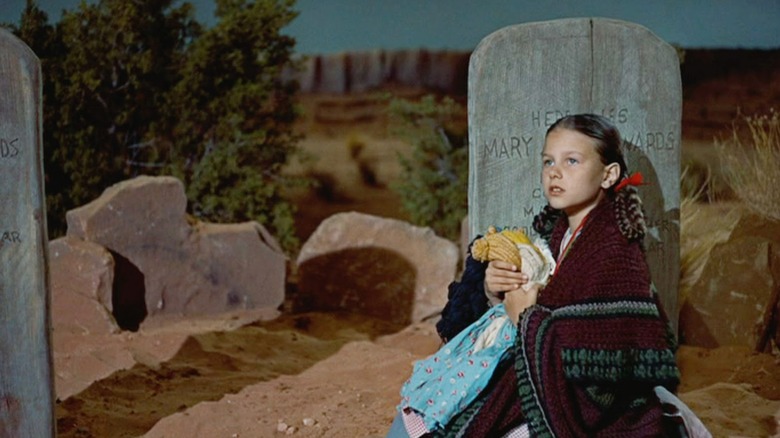Firefly Ending Explained: A Mistreated Series, A Follow-Up Film, And A Complicated Legacy
The western and space opera are two genres that have often intersected, from "Star Trek" and "Star Wars," to "Cowboy Bebop" and "Outlaw Star." Still, the most overt melding ever remains Joss Whedon's "Firefly." Premiering on Fox in 2002, the series' setting was a cosmic version of the post-Reconstruction era Wild West. Series lead Malcolm "Mal" Reynolds (Nathan Fillion) was modeled as much on Han Solo as on Ethan Edwards, John Wayne's anti-hero from "The Searchers." In spite of its truncated 14 episode run, "Firefly" acquired a dedicated fanbase, one that earned it a 2005 follow-up film, "Serenity."
Objects in space
One reason for Firefly's swift demise was that the network aired the episodes out of order — the series' pilot, "Serenity," which was hastily replaced by "The Train Job," was actually the last episode to be aired. The final chronological episode was "Objects in Space," which featured a bounty hunter named Jubal Early (Richard Brooks) slipping onto the crew's ship in order to capture the mysterious River Tam (Summer Glau), whose psychic powers are starting to become more apparent.
"Objects in Space," directed by Whedon, is clearly not meant as any sort of finale. An early scene in the episode features River telepathically gleaning the other characters' thoughts, with those thoughts planting seeds for where their arcs were intended to lead. The episode does explore one of Whedon's pet themes, that of existentialism — as River notes, we're all ultimately "objects in space" — but this is merely a pondering detour, not a thesis.
The closest thing to being conclusive about the episode is that it finally peels back the mystery surrounding River; up to this point, she'd been an enigma. This continues in the series' ultimate conclusion, "Serenity."
Serenity on the silver screen
During the series, one of threats to the protagonists had been Reavers, cannibalistic savages who'd gone insane on the edge of space. Whedon said, "Every story needs a monster. In the stories of the old west, it was the Apaches." "Serenity," the follow-up movie which caps off the story told in the "Firefly" TV series, reveals that humanity's governing body, the Alliance, created the Reavers in a failed experiment. The Alliance developed a drug named "Pax" to pacify populations and tested it on the settlement of Miranda. 99% of the subjects lost any will to do anything, and so just laid down and died. The other 1% had the opposite reaction, becoming Reavers. This revelation reignites Mal's rebel spirit, and the crew of Serenity decide to broadcast the revelation to the galaxy. Despite casualties, the crew succeeds; the film ends with Mal and River co-piloting the ship and flying off into the black of space for further adventure.
The film's villain, an agent of the Alliance known only as "The Operative" (Chiwetel Ejiofor), says his goal is a world without sin. Miranda shows what that world would be like: There's nothing more human than imperfection, and the only way to be perfect is to do nothing at all. At the same time, if we lose ourselves to those imperfections, we become monsters. Beyond the basic humanism of this message, there's a strong streak of anti-authoritarianism, if not outright libertarianism. Large institutions and governments need to stay out of the people's way and not impose behavior on them, the movie (and show) says, recalling the cowboy's dream in so many classic westerns.
Where allegory falls apart
The legacy of Whedon's body of work has been stained by revelations of his (un)professional behavior. That's not to say "Firefly" doesn't have issues within its text. The series uses the mythology of the Civil War, but removes the context of human slavery and positions the "Browncoats" (Confederates) as plucky rebels who really were just standing up for their independence against an encroaching central government.
This is a consequence of Whedon's inspirations, from Michael Shaara's novel "The Killer Angels" to Golden Age Hollywood westerns, which had a similar romanticization of the South and frontier freedom. Similarly, the Reavers are a transplant of the monstrous stereotypes of native Americans, but stripped of any real-world cultural baggage. "The Searchers" doesn't hold up by the 2020s' standards of cultural enlightenment, but it at least interrogates its genre's politics. In contrast, "Firefly" just indulges in the tropes.
In any case, "Serenity" disappointed at the box office, and the "Firefly" 'verse has been confined to comics ever since. With so much of the show's charm having come from a cast who've aged out of their roles, it's for the best that it stays there.



